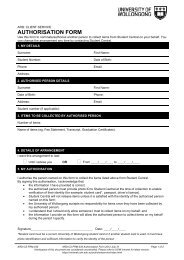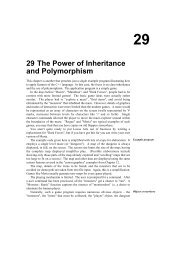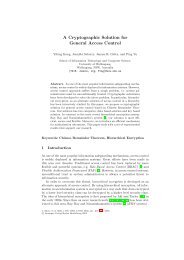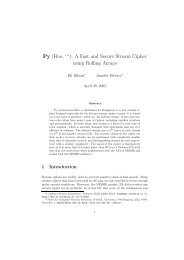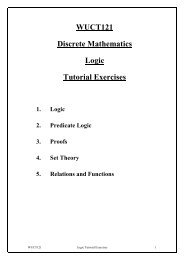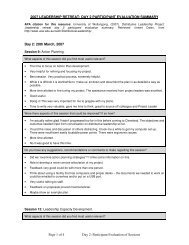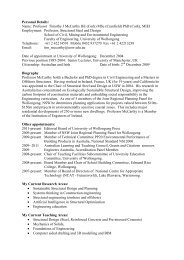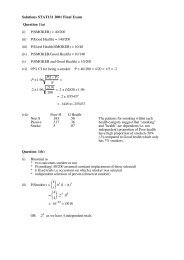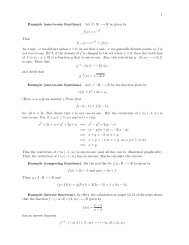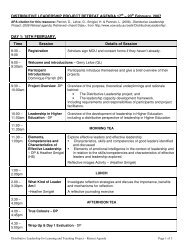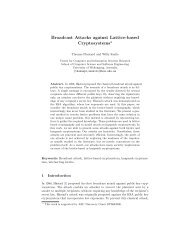india author m 1- a-nan - University of Wollongong
india author m 1- a-nan - University of Wollongong
india author m 1- a-nan - University of Wollongong
You also want an ePaper? Increase the reach of your titles
YUMPU automatically turns print PDFs into web optimized ePapers that Google loves.
frequently. The labyrinth is associated with the mysterious Anuradha, "a labyrinthine woman,<br />
at once young and old."<br />
ROSS, ROBERT. "The Clash <strong>of</strong> Opposites in Arun Joshi's The Last Labvrinth." The Literary<br />
Criterion 25.2 (1990): 1-9.<br />
In each <strong>of</strong> novels, Joshi creates an anti-hero who, like his Western counterpart, stands<br />
overlooking the abyss <strong>of</strong> his time and place. But his protagonists have to come to terms not<br />
only with the native heritage, but also the Western influence on it, the clash <strong>of</strong> opposing<br />
traditions. Joshi's achievement in The Last Labyrinth lies in bringing together the disparate<br />
parts <strong>of</strong> the hero's experiences. This clash <strong>of</strong> opposites finally imprisons Som Bhaskar in the<br />
labyrinth <strong>of</strong> his own mind.<br />
SHARMA, D.R. "Arun Joshi and his Reflective Insiders" Literature East and West 21.1-4<br />
(1977):100-111.<br />
SHARMA, D.R. "The Fictional World <strong>of</strong> Arun Joshi" The Indian P.E.N. 43.9&10 (1977):1-<br />
5.<br />
SHARMA, D. R. "The Fictional World <strong>of</strong> Arun Joshi." The Indian P.E.N. 43, no.9/10<br />
(September-October 1977): 1-5.<br />
It is not correct to treat Joshi's heroes as the Indian kinsmen <strong>of</strong> the Western<br />
existentialist "outsiders". In their persistent quest for decent alternatives in an amoral world,<br />
Joshi's protagonists are reflective insiders. Joshi resembles Manohar Malgonkar in his social<br />
satire and fictional technique, the major difference being that Malgonkar's action is "out there",<br />
while the action in Joshi is primarily in the psychic arena <strong>of</strong> his characters. Joshi's protagonists<br />
strive for an enduring dialogue with life. Sindi <strong>of</strong> The Foreigner realises that detachment<br />
"consisted in getting involved with the world." In The Strange Case <strong>of</strong> Billy Biswas, Billy opts<br />
out <strong>of</strong> the prevailing social order when he finds it impossible to change it. Joshi's third novel,<br />
The Apprentice, is a confessional novel, which explores the evil in the protagonist as well as<br />
the horror <strong>of</strong> an imperfect social order.<br />
SHARMA, D R. "Arun Joshi and His Reflective Insiders." Literature East and West no. 21<br />
(1977): 100-109.<br />
Somewhat amplified version <strong>of</strong> "The Fictional World <strong>of</strong> Arun Joshi" (see item).<br />
SHETTIGARA, TINA. "Arun Joshi's The Foreigner: The Protagonist in Search <strong>of</strong> Meaning."<br />
In Cultural Reflections, edited by Paul Sharrad, Honolulu: East West Centre, 1981: pp.50-58.<br />
The central characters <strong>of</strong> Joshi's novels are all individuals in some way alienated from<br />
the world around them. The protagonist <strong>of</strong> The Strange Case <strong>of</strong> Billy Biswas is the most<br />
extraordinary <strong>of</strong> Joshi's heroes; Billy, an anthropologist, is overcome by his primordial urge to<br />
be free <strong>of</strong> the veneer <strong>of</strong> urban society, and disappears. Ratan Rathor, <strong>of</strong> The Apprentice, is<br />
"Mr Ordinary" who is corrupted by the material world. Som Bhaskar, a rich businessman, the<br />
protagonist <strong>of</strong> Joshi's fourth novel, The Last Labyrinth, is subject to the craving <strong>of</strong> a nameless<br />
desire. He is obsessed by Anuradha, a mysterious character in this novel <strong>of</strong> enigmas. The<br />
novel's structure is as labyrinthine as the processes <strong>of</strong> Som Bhaskar's mind. Though the<br />
treatment is growingly sophisticated, Joshi's interest has always been the alienated individual,<br />
present as Sindi Oberoi, the protagonist-narrator <strong>of</strong> his first novel, The Foreigner. The<br />
Foreigner is constructed on two cross-cutting time spans, in America and in New Delhi. Sindi<br />
observes with objectivity the culture <strong>of</strong> both societies, but the novel should not be treatbd as



